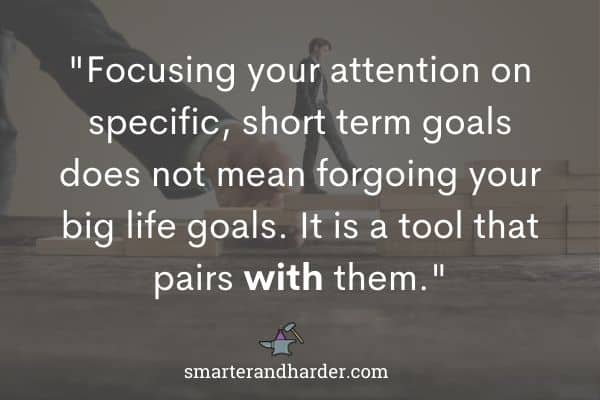When you read about setting and achieving goals, much of the conversation often centers on massive, life-trajectory-altering aspirations. It makes sense – these are often the most challenging goals to achieve, and the payoff can be well worth the pursuit. But where does that leave humble, everyday, short-term goals?
Knowing what you want to achieve five years from now is incredibly powerful, and there’s nothing wrong with setting your sights on major personal goals. In fact, you’ll probably have to if you want to achieve those things in your lifetime. Even so, it’s crucial not to overlook smaller short-term goals in building the life you want to live.
The Purpose of Short-Term Goals
The key to using short-term goals effectively is understanding how and when to use them. There are several benefits to having smaller goals right alongside your big ones:
- Breaking down large goals into smaller pieces makes them more achievable
- Regularly achieving small wins builds long-term motivation and resilience
- Narrowing your focus to a single task at a time does wonders for productivity
Keeping track of specific goals in a short time frame does not mean forgoing your big life goals. Instead, it is a tool that pairs with them. When you think strategically in setting goals, smaller objectives can combine to form an action plan for the bigger initiatives.

Benefits of Short-Term Goals
Achievability
One framework for goal-setting that has become extremely popular in recent years is “SMART goals.” The phrase is an acronym for Specific, Measurable, Attainable, Realistic, and Time-Bound goals.
Not all types of goals need to fit into this model, but some find it an effective way to make them clear and achievable. And it is particularly well-suited to short-term tasks and objectives. Specific goals with a clear finish line are easier to reach than vague aspirations, and short-term goals are much easier to define in that way.
Emotions and Motivation
Staying motivated while working towards major career goals or other personal aims is no small feat. By definition, these things take significant time, not to mention effort and the obstacles you will encounter along the way. To stay on track with these things, you need tools to bolster motivation.
Accomplishing a small goal on the road to a bigger one gives you a win. Each win, even a small one, provides an emotional boost that helps motivate you to keep working toward the big goal. However, the high-level mission may not be emotionally rewarding enough on its own to keep you moving forward.
The Sum of Many Parts
Small wins are a great tool for keeping motivation up, but small wins also don’t live in a vacuum. By setting and accomplishing bite-sized tasks consistently over time, these wins can add up to tremendous growth and progress.
No matter what you plan to achieve a year from now, don’t underestimate the value of taking clear steps forward today, tomorrow, and the next day.
Finding Balance
One of the biggest challenges with goal-setting, particularly for motivated folks in the personal development community, is making room for the different parts of life. We need many things for a happy and healthy life that may not register on the scale of massive business goals or delivering on your personal mission statement.
For instance, we all still need to pay our taxes, get our cars fixed, and wash the dishes, but how does any of that serve anyone’s long-term goals? It doesn’t, at least not directly. Keeping tasks and projects like these as short-term goals helps make room for them without losing sight of the big things we care most about.
Goals Vs. Objectives
When setting short-term goals, it’d be easy to think of them as synonymous with objectives, but the two aren’t entirely the same.
Generally, a goal describes an outcome, whereas an objective is an action to take to achieve an outcome. Together, objectives can form a plan or strategy to achieve a goal.
For instance, if you plan to save a certain amount of money this month, that is a goal because it describes an outcome. On the other hand, the things you might do to achieve that outcome – like making a budget, canceling subscriptions, or having a yard sale – would be objectives in service to that goal.
Some goals are complex and require many steps to complete. Other goals, particularly short-term ones, may be quite simple and contain as little as a single objective. For example, getting your car clean is a goal with one objective: clean the car. At a small scale like this, the difference between the two can be rather subtle but is nonetheless crucial to keep in mind in the goal-setting process.
Types of Short-Term Goals
You can use short-term thinking to drive long-term progress in many areas of your life, such as with personal, professional, social, or financial goals. But which part of your life they serve is not necessarily the most important way to distinguish between goals.
It is also vital to think about different types of goals. This distinction can inform how you approach, set, and plan to achieve them.
Component Goals
Often, the trick to achieving big goals is to break them down into parts that we can manage. Component goals are those manageable parts.
One of the most valuable uses of small goals is stacking them up to serve more significant ones. Often, these will focus on a single or small set of objectives that contribute to a larger end product.
Rather than trying to turn around your finances, get in perfect shape, or reinvent your career all at once, look for individual components of that one big thing. Pick something you understand and know you can achieve, and then do it. And like that, your big goal gets a bit smaller.
“0 to 1” Goals
Similar to component goals, but crucial enough to warrant their own discussion, are something we call 0 to 1 goals.
One of the biggest things that keeps us from completing important life goals is that we never start. Therefore, starting is the most crucial step you can take to improve your chances of future success. It doesn’t have to be a massive leap forward; it only needs to take your big goal from an idea to something in progress. We call this going from 0 to 1.
0 to 1 goals should be simple and straightforward: make your new exercise schedule; register the domain for your website; research three new jobs; etc. The purpose is not to finish some colossal project but to get the ball rolling. To move you from something that hasn’t begun yet to something that has.
One-Off Tasks
Short-term goals aren’t solely for rolling up into big, life-changing goals. They also help to manage, plan, and execute many of the minor things we need to take care of.
You can also think of these goals as things on your to-do list. These can include chores around the house, errands, and other “life logistics” like paperwork.
Generally, completing one of these tasks won’t significantly improve your life. However, staying on top of these tasks is vital for a happy and peaceful life. Naming each as one of your short-term goals is a helpful way to prioritize and make room for them alongside more extensive, long-term efforts.
Tips for Making Short-Term Goals Work
Effective goal-setting has many facets and strategies but is quite simple at its core. If you can ask yourself where you want your life to take you and write down the steps you will take to get there, you’ve already solved most of the puzzle.
However, there are nuances to the practice that warrant some discussion. Often, achieving your goals comes down to how you approach these subtleties from the start. Start with a few of the following simple tips to understand how to set short-term goals that make sense and that you can consistently achieve.
Start With “Why?”
As with any goal, starting with a strong “why” behind it is essential to maintaining the focus and motivation necessary to see it through. Whether your goal is a single component of a long-term dream or simply to renew your car registration, knowing the purpose will help to plan, prioritize, and deliver.
Focus on Completability
You don’t necessarily need to strictly follow the SMART goal model to set effective goals, but keeping its spirit in mind can help achieve goals at any scale. Don’t sweat it too much if the rigid structure feels overly restrictive. Instead, focus on setting goals with a clear, actionable component and a finish line you can reach.
Much of the value of short-term goals is the emotional reward of moving forward quickly and feeling a sense of progress. Maximize that value with clear criteria and objectives.
Watch out for Scope Creep
Small goals should stay small but won’t necessarily do so alone. Plans can always change, and sometimes new tasks come into the workflow. Try to keep your initial goal in mind as much as possible, and when necessary, set a new, separate goal to address new things that come up.
Keep the scope of your work narrow, and try not to get too stuck in the details.
Keep a List
Whether you use a notes app, calendar, task tracker, or plain pen-and-paper to-do list, tracking smaller goals is critical to managing them. Juggling life’s many efforts and obligations is far from easy and always on the move.
Writing down the things you plan to focus on and achieve helps to balance them against the constantly flowing tide of other things that will undoubtedly come up.
Don’t Lose the Forest for the Trees
The emotional reward of having small, completable tasks is a great productivity tool, but it can also be a slippery slope. Be careful not to focus too heavily on short-term goals solely to “get more things done.”
Goals of any size should always have a clear “why” and help move toward the picture of the life you want to live. Taking on unnecessary work just for the rush of being “productive” is the basis for problems like busyness and the multitasking myth.
Short-Term Thinking for Long-Term Progress
Even in a community where we often stress the importance of setting big, life-changing, shoot-for-the-moon goals, there is still space for simple short-term goals. Rather than one working against the other, both are crucial tools for building a happy, thriving life.
Small, manageable, achievable goals help create the focus and motivation to stay on track with those bigger tectonic shifts over the long term. They can also help us stay on top of the day-to-day business of life in a way that makes sense.
When you use them effectively, short-term goals are a vital mechanism for effecting the types of long-term growth and positivity that give life its flavor.

